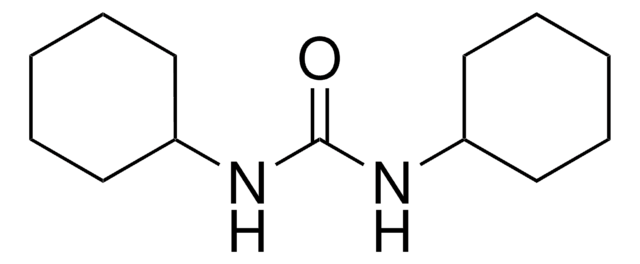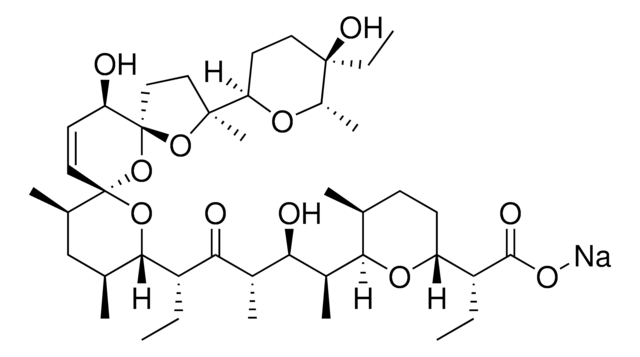36650
DCC
≥99.0% (GC), for peptide synthesis
Synonyme(s) :
N,N′-Dicyclohexylcarbodiimide
About This Item
Produits recommandés
product name
DCC, puriss., ≥99.0% (GC)
Qualité
puriss.
Niveau de qualité
Pureté
≥99.0% (GC)
Forme
solid
Capacité de réaction
reaction type: Coupling Reactions
Point d'ébullition
122-124 °C/6 mmHg (lit.)
Pf
32.0-37.0 °C
34-35 °C (lit.)
Solubilité
methylene chloride: 0.1 g/mL, clear, colorless
Application(s)
peptide synthesis
Chaîne SMILES
C1CCC(CC1)N=C=NC2CCCCC2
InChI
1S/C13H22N2/c1-3-7-12(8-4-1)14-11-15-13-9-5-2-6-10-13/h12-13H,1-10H2
Clé InChI
QOSSAOTZNIDXMA-UHFFFAOYSA-N
Informations sur le gène
human ... EPHX2(2053)
mouse ... Ephx2(13850)
Vous recherchez des produits similaires ? Visite Guide de comparaison des produits
Description générale
Application
It may be also used to synthesize:
- 1,3-Thiazetedine derivatives via [2+2] cycloaddition with 2-phenylethenyl- and 2-(4-nitrophenyl)ethenyl isothiocyanates.
- 1,3,5-Oxadiazine-4-thiones via [4+2] cycloaddition with benzoyl isothiocyanates.
- Sterically hindered 1,3,4-oxadiazole derivatives by reacting with (N-isocyanimino)triphenylphosphorane the presence of aromatic (or heteroaromatic) carboxylic acids.
Autres remarques
Mention d'avertissement
Danger
Mentions de danger
Conseils de prudence
Classification des risques
Acute Tox. 3 Dermal - Acute Tox. 4 Oral - Eye Dam. 1 - Skin Sens. 1
Code de la classe de stockage
6.1D - Non-combustible acute toxic Cat.3 / toxic hazardous materials or hazardous materials causing chronic effects
Classe de danger pour l'eau (WGK)
WGK 3
Point d'éclair (°F)
235.4 °F - closed cup
Point d'éclair (°C)
113 °C - closed cup
Équipement de protection individuelle
Eyeshields, Faceshields, Gloves, type P2 (EN 143) respirator cartridges
Faites votre choix parmi les versions les plus récentes :
Déjà en possession de ce produit ?
Retrouvez la documentation relative aux produits que vous avez récemment achetés dans la Bibliothèque de documents.
Les clients ont également consulté
Notre équipe de scientifiques dispose d'une expérience dans tous les secteurs de la recherche, notamment en sciences de la vie, science des matériaux, synthèse chimique, chromatographie, analyse et dans de nombreux autres domaines..
Contacter notre Service technique











